Jonathan and Michael Rosen undoubtedly grew up embodying the stereotypical brothers: wrestling all around the house much to their parents being filled with infuriation, pushing one another’s buttons just to reach their breaking point, begging to be included in another’s social circles as they got older. Naturally, when you begin diving into their band Cones’ debut album, listeners will come away confident with the assumption they have been playing music all their lives together. In reality, the siblings just started collaborating only a handful of years ago after an unfortunate circumstance.
Recorded at Honeymoon Suite (their home studio), Pictures of Pictures (Dangerbird Records), which is out now, is the product of two individuals emerging different influences into quite the breezy experience that shimmers with pop sound. The album’s opener “The Hole” is a futuristic number with sundrenched keys and robotic vocals. One of the most active tracks “Laugh Of The Party” includes punchy guitars and chirpy synth. “Nicemare” is perhaps one of the more psychedelic tracks on the album. Lyrically, Pictures of Pictures balance loss and sadness with hope and joy…an ideal balance that is of course conceived by siblings.
We recently caught up with Cones to learn more about their past, present, the debut album, and more.
First off, we spoke to Michael:
Growing up, you were passionate about the classical piano. What forms of the subject did you find yourself immersed in more than others?
When I was a little kid, classical music felt more like an obligation than a passion. It takes time to develop the passion. When I was around 12, I was fortunate to have a teacher that turned me onto composition. Through composing classical music, I began to become passionate about creating music, not just practicing it.
Who were some of your favorite composers and what was about them their work that spoke to you?
That question has many answers. It changed/changes all the time. When I was young and discovering composition, I was very connected to Beethoven and Chopin. Later in high school, I got into minimalist composers like Reich, John Adams, Terry Riley, Glass, etc. In college, I started to explore electro-acoustic music, especially spatial sound compositions. I got pretty into Janet Cardiff, Stockhausen, and Xenakis, among others. Now I mainly listen to Brazilian 60s and 70s music.
Besides the work that you are doing with Cones, has there been any desire to compose music for different ventures? Say more orchestra-based productions?
I have a recording studio where I produce other bands/musicians as well. I have written commercial music and film scores, and have done a bunch of interactive sound installation projects. Now I’m starting to get into weird video game sound design.
In your stint with Icewater, one of your bandmates and closest friends passed away. What were some of your fondest members of Grant?
That’s an extremely tough question. Grant and I were best friends from age 15 until 26 when he passed away. We went to high school and college together. He was my freshman-sophomore and junior roommate. And after college, we moved to NYC together. It’s impossible to express a few memories to tell the story of our friendship. Rather, it’s the entire impression of all the memories that drive me, and Cones, to keep creating and pursue my dreams.
Did you found asking Jonathan to join the band challenging?
No, it felt completely natural. We realized if we wanted to continue the band, we needed someone that was just as close to Grant as we were. He was always part of the Icewater family.
Then we spoke to Jonathan:
You unabashedly focused on other creative projects growing up instead of music. What made you look to do everything else but play music?
I always felt musical even though I didn’t commit to learning an instrument until high school. I grew up obsessed with Elvis, particularly his physicality and movement. He was never still. I don’t like things to be still, which is why I move a lot onstage and also probably why my cartoons are so wobbly. I used to draw comics of the Beatles. As a kid, I was always more of a fanatic than a musician and interested in the visual elements of music. I was drawn to how musicians can be represented through imagery, which totally informs my art to this day. I’d always had a strong sense of melody I think – making up tons of little tunes in my head. At a certain point, I wanted to have an instrument to legitimize the songs, which is when I started learning guitar.
Your father purchased a guitar for you after discovering that you were writing poems and songs to cope with a friend’s death. Did you ever consider at any point, not learning how to learn?
(The) guitar came into my life at the perfect moment. I don’t even remember deciding to learn it – it just sorta happened and felt fluid.
Was there any pressure from your family (and more specifically your brother) to give music a try when growing up?
My parents thought that since Michael was such a gifted and technical classical musician from such an early age, maybe I’d be that way too. They enrolled me in violin class. I was so terrible, and I hated it. I’d detune my violin before each lesson so we’d have to waste time tuning it. I was in a kid’s symphony thing one summer, and I didn’t learn the piece, so I pretended to play, putting the bow an inch above the strings. I thought I was fooling everybody, but I really wasn’t. I think my parents were sick of the disturbing screeching sounds, so they let me stop. I really just wanted to draw and make weird things in my room and listen to the Beatles.
Your favorite color reportedly is traffic cone orange. What is it about this color that you love so much?
I don’t know why I love orange so much. I don’t know if I like cones because they’re orange or if I like orange because I like cones. Best not to think about it too much…
Watching your animation work, I keep noticing that there’s an abstract quality to it. Would you say that artists like Picasso are one of your influences?
Yes, I love Picasso deeply. One of the things I think about when I animate is what would it look like if the great classic painters and illustrators had made animations. I definitely think about Picasso in that context, along with Philip Guston or Saul Steinberg. I think Nickelodeon really adopted those artists’ aesthetics in the nineties so successfully.
Finally, we caught up with the duo together:
Was there any sibling rivalry in regards to one another’s projects when you were young?
Michael: We didn’t have much a rivalry with regards to creative projects, mainly because we were pretty different in that respect. Jonathan was a really good actor, and I was just awful. We were in a play together in Hebrew School, the annual Purim play, where he played the lead (Mordecai), and I played one half of Humpty Dumpty (a made-up role) and messed up my one and only line.
I was more of a focused classical musician and took that study more seriously than anything else. Jonathan was incredibly creative with visual art, making films, animations, paintings, etc. Our biggest rivalries were over NHL 99 on Nintendo 64, and Ping Pong.
You two spent some time in NYC after college. What was the main takeaway creatively that you took away?
NYC was a pretty crazy time. Being in your mid-20s and trying to find your path in that city is a big challenge. The hardest part is finding not only your voice but finding/creating a supportive community. We felt very fortunate to have a solid group of friends and musicians making amazing work.
Being on the road playing music together for the first time, what was those days like for you two?
It was really fun. We have had a lot of practice being in close quarters, so it felt very natural.
Do you remember anything from that first Icewater show?
Michael: Sort of. It was about ten years ago, so the memory is a bit foggy. The first iteration of that band was Grant, my friend Malcolm, and myself, and it was all acoustic. I think we played in a little art gallery in Bushwick.
What led you to steer away from Icewater and focus on Cones?
Michael: Icewater felt like more than a band to us. After Grant passed away, Jonathan joined the band. It was extremely difficult to move forward, but we felt a new life when Jonathan joined. We needed to continue the group to cope with such an extreme loss, so it was a very therapeutic experience.
Eventually, it felt as though the band existed just to support the weight of our grief. Just as we felt compelled to continue it before, we knew it was time to move on. At that point, Jonathan and I decided to start Cones.
There is a collection of Cones songs that were ultimately scrapped. What was about them that you two felt didn’t connect with your vision?
Jonathan: A few things. I think the songs I was writing at that time were coming from somewhere else inside of me. I think they lacked some of the humor that I’m usually drawn too. Don’t get me wrong I love writing a sad song, and a few of the songs on our new LP are quite sad. But I find that in music and art in general, humor and lightness can be such a good way of disarming the audience – lowering their guard so that some of the more heavy sentiments can settle in a bit more gently. Also, we made that record with our incredibly gifted friend in his home studio. Michael and I were accustomed to recording everything ourselves in our own space. We were exploring our sound with someone else and learned an unbelievable amount in that time. Ultimately I think we realized that a lot of the magic of our music comes from us having unrestricted access to the process and just fighting and making up and building something just between us. Also, we do so much writing and revision in the studio, so with that scrapped record, I felt like a lot of the songwriting decisions I made were things I would have changed if I had a bit more time to fiddle with them in the studio.
Is there any discussion of ever releasing those tracks? Perhaps make it be a B-side release?
Absolutely. There are a few jams I’d love to put out someday. Also one of them is actually out on Spotify. It’s called “Run The Risk”. We put it out like a year and a half ago.
How long did you two work on the new album?
We recorded the first note in June of 2018 and mastered it in February 2019. We worked nonstop in between. Nearly all the songs were written at that time too.
When writing the lyrics, is it a collaborative effort?
Jonathan: Michael has nothing to do with the lyrics, and he would be the first to say that. He’s not focused on them, and thankfully -because it allows him to focus on the sounds themselves. Our relationship is very symbiotic. We make up for one another’s shortcomings pretty well.
What could you say that you two have learned about each that you didn’t know before creating music together?
Honestly nothing. We spend so much time together that I almost feel like I know him less. I’m too close. I don’t know who he is. Where am I?


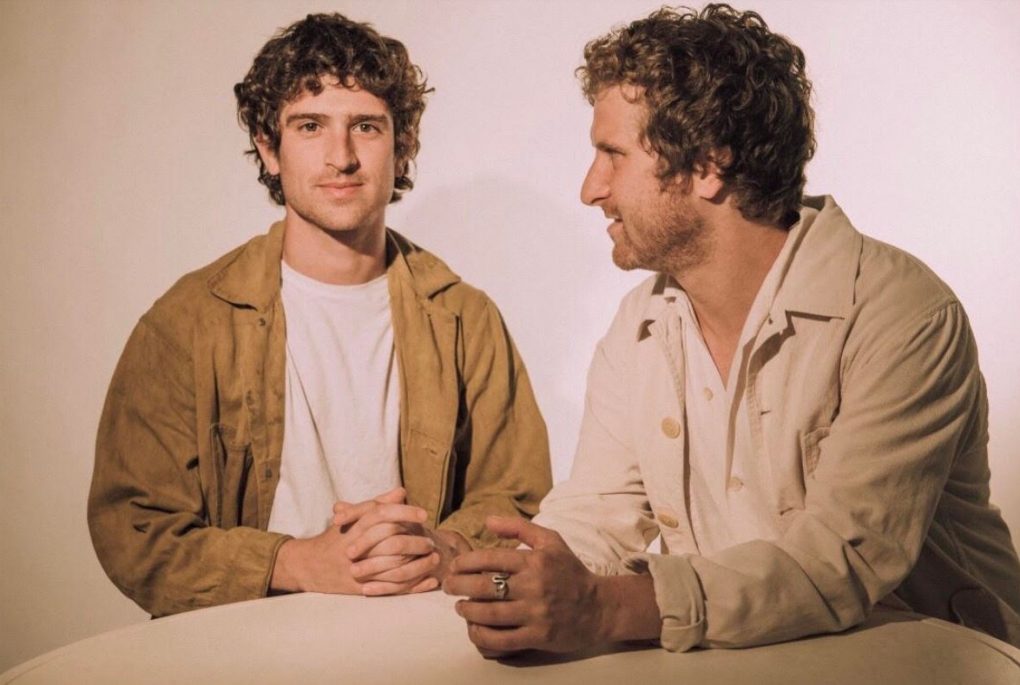
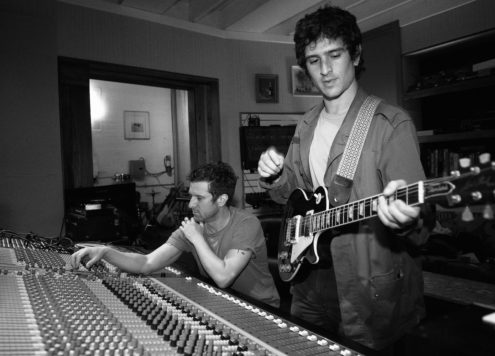
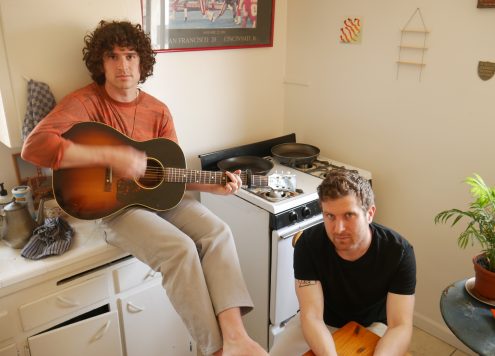

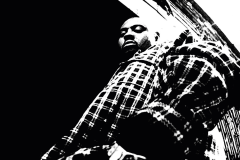
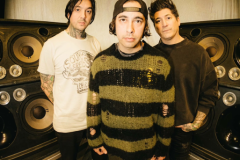
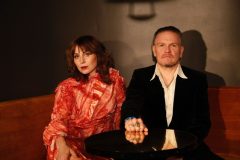
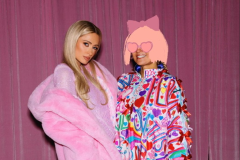

Social Media